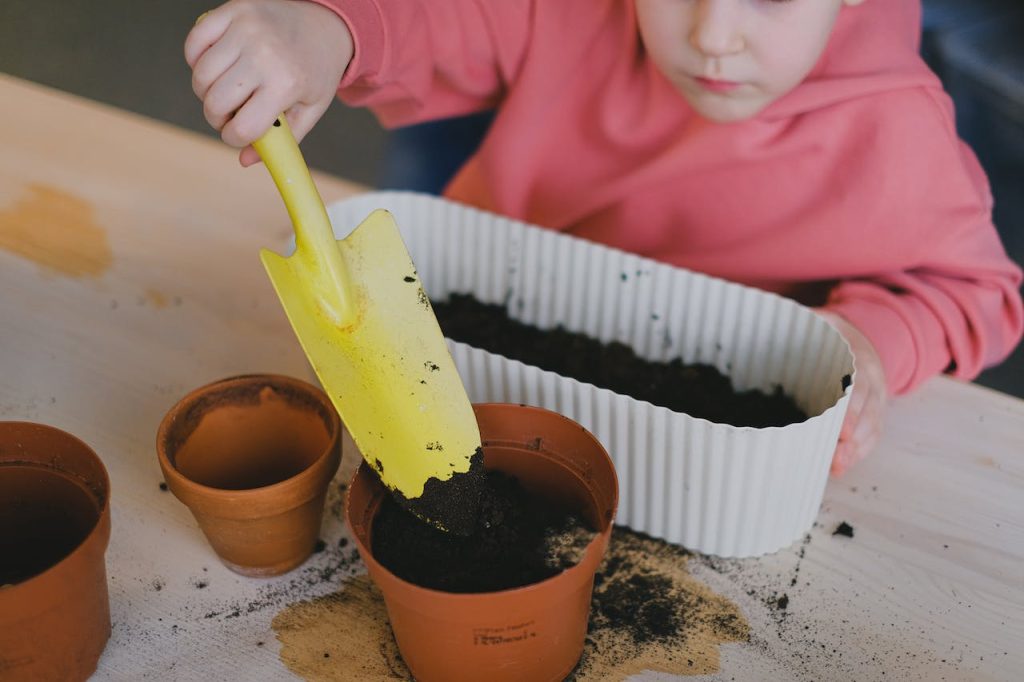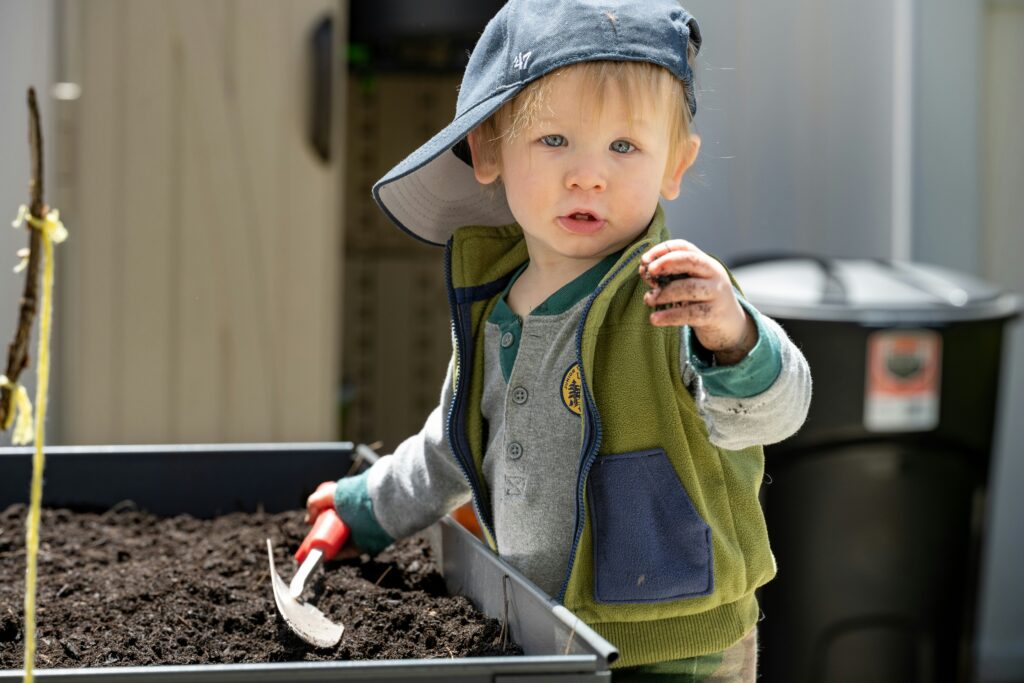Working hours
Mon - Fri: 8am to 5pm
Mon - Fri: 8am to 5pm
Menu
Share

The routines established during childhood frequently influence an individual’s lifestyle and behavioural tendencies in later life. Engaging in gardening activities such as growing fruits and vegetables presents a distinct opportunity to foster enduring, beneficial habits concerning nutrition, mental health, physical activity, mindfulness, and environmental consciousness in our children.
Gardening with children provides a unique opportunity to instil healthy eating habits from an early age. This is particularly important given the food landscape this generation of children are growing up in. With almost every shop, outlet, billboard and advertisement focusing on ultra-processed convenient foods high in salt, sugar and fats. Whilst these may appear tempting and convenient, they are detrimental to our health, childhood development and to the wider environment.
Engaging in gardening allows children to actively participate in the cultivation of fruits and vegetables, fostering a deeper connection to the food they eat. This involvement empowers children to assert independence in their dietary choices, granting them a sense of ownership and influence over what they consume. When children feel a part of the growing process, they are typically more motivated to consume the nutritious produce they have helped to cultivate
Homegrown fruits and vegetables often boast higher nutrient content owing to superior soil quality, reduced chemical exposure, and minimal transportation time. By consuming homegrown produce, children can support their health and development while gaining firsthand insight into the growth cycle, thereby understanding and appreciating the nutritional value of fresh, whole foods.
This hands-on approach not only promotes healthier eating habits but also instils a lifelong understanding of the origins of food, its environmental impact, and its role in maintaining a healthy balanced diet.

Physical and Mental Health
Gardening offers a holistic approach to support children’s physical and mental well-being. Gardening can be a very physical activity with planting, weeding, and tending to the garden contributing to general activity levels, improved motor skills, coordination, and overall physical health.
An important factor is the very nature of gardening means that children spend more time outside. Exposing children to sunlight, promoting the synthesis of vitamin D, essential for bone health and our mood. With 16% of children in the UK estimated to have a vitamin D deficiency, almost 20% of children in the UK having vitamin D levels lower than the recommended amount and 1 in 6 adults in the UK having low levels of vitamin D, family time outside in a garden could be a bone-boosting, mood boosting family activity.
The combination of a colourful garden, particularly the colour green can have a calming effect on anxiety and an uplifting effect on our mood. Exposure to the colour green in nature has been associated with a reduction in blood pressure and a decrease in anxiety.
Gut Health and Gardening
There are many benefits gardening brings to children’s gut health: –
1. Enhanced nutritional quality of the produce eaten provides more fibre, vitamins, minerals, and antioxidants which supports digestive health
2. Certain fruits and vegetables contain prebiotic fibres that serve as fuel for beneficial gut bacteria
3. When children play outdoors and get their hands dirty, they come into contact with diverse microorganisms present in soil. Exposure to these beneficial microbes can have a positive impact on the development of their immune systems and gut microbiota.
4. In particular, exposure to a variety of environmental microbes found in soil, can contribute to a more diverse and resilient gut microbiota. A diverse microbiota is associated with better overall health and a reduced risk of certain diseases.
5. Increased movement by being outdoors increases levels of physical activity which is associated with a more diverse gut microbiota

Educational and Development aid
1. Enhances Motor skills – activities like digging, planting seeds, and watering plants require fine and gross motor skills, aiding in the development of coordination and muscle strength in children.
2. Teaches responsibility – gardening instils a sense of responsibility in children as they care for plants, water them regularly, and ensure they receive proper sunlight, fostering important life skills.
3. Improves concentration – gardening requires focus and attention to detail, which can help improve children’s concentration and cognitive abilities.
4. Boosts self-esteem – successfully growing plants and witnessing their progress can boost children’s self-esteem and sense of accomplishment, fostering a positive self-image
Time outdoors should, as much as possible be a key feature in childhood yet many children are not as ‘outdoorsy’ as previous generations. We have of course, many technological advancements to tempt children onto devices but nothing can compare to the multiple health benefits of time spent outdoors.
We need this generation of children to understand the connectiveness of our food landscape, our responsibility as consumers and the impact on the wider environment as we surely cannot sustain the levels of food production and food waste we currently have? Gardening could combine both physical and mental health boosting activities whilst having a positive impact on the natural world and wider environmental benefits.
Louise Mercieca
Nutritional Therapist & Early Years Consultant
You can book Louise for consultancy or training with your team.
With the ever-changing regulations and guidance, join our monthly newsletter to stay current and learn more about running a better childcare setting.
Simply enter your details below to join our mailing list.
"*" indicates required fields
By completing this form you are agreeing to our privacy policy You can unsubscribe at any time

Millennium House, High Street,
Studley, Warwickshire, B80 7HJ.